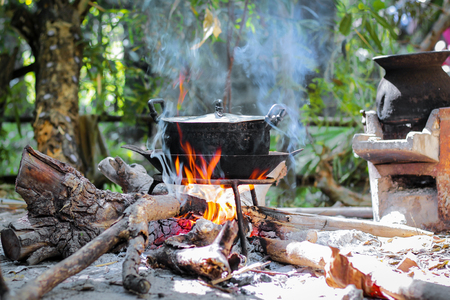Introduction to Wild Camping and Fire Safety
Wild camping in the UK is a cherished pursuit for those seeking adventure, solitude, and a closer connection with nature. From the rugged highlands of Scotland to the rolling hills of Dartmoor, pitching a tent away from established campsites offers an unmatched sense of freedom and discovery. For many outdoor enthusiasts, wild camping represents a return to basics—living simply and treading lightly on the land. However, this experience also comes with significant responsibilities, particularly when it comes to fire safety. The UK’s diverse landscapes are often sensitive to fire risk, especially during dry spells or in areas with dense vegetation. Understanding and respecting fire safety laws is crucial not only for protecting the countryside but also for preserving access rights for future campers. As such, being aware of both legal requirements and best practices ensures that everyone can enjoy wild camping while minimising potential harm to people, wildlife, and the environment.
2. Understanding Fire Safety Laws Across the UK
Wild camping is a cherished tradition for many outdoor enthusiasts in the UK, but it comes with a responsibility to understand and respect the fire safety laws that vary across its four nations. While the aim of these regulations is universal—protecting people, wildlife, and natural habitats from wildfires—the details differ significantly between England, Scotland, Wales, and Northern Ireland. Below, we break down the key differences to help you stay compliant wherever your adventure takes you.
Fire Safety Regulations by Region
| Nation | Legislation & Guidance | Key Restrictions on Wild Camping Fires | Penalties for Non-Compliance |
|---|---|---|---|
| England | Countryside and Rights of Way Act 2000 Local bylaws (varies by area) |
No open fires on access land; strict bans in many National Parks; always check local bylaws. | Fines up to £2,500; possible prosecution if fire spreads or causes damage. |
| Scotland | Land Reform (Scotland) Act 2003 Scottish Outdoor Access Code |
Small campfires allowed if safe and responsible; avoid peatland; follow Leave No Trace principles. | Fines or exclusion from access rights if guidelines are breached. |
| Wales | Countryside and Rights of Way Act 2000 National Park regulations |
No open fires on most access land; some managed campsites may allow controlled fires. | Fines and criminal charges for causing wildfires or ignoring bans. |
| Northern Ireland | The Wildlife (Northern Ireland) Order 1985 Forest Service NI regulations |
Open fires generally prohibited in public forests and open countryside; exceptions very rare. | On-the-spot fines; prosecution for serious breaches. |
The Importance of Local Bylaws and Temporary Restrictions
A crucial aspect of fire safety law in the UK is that local authorities, National Parks, and landowners have the power to introduce additional restrictions or temporary bans—especially during periods of high fire risk. Even if national law permits a small campfire under certain circumstances, local rules may override this. Always check signage, websites, or contact rangers before lighting any fire.
Main Takeaways for Wild Campers
- Never assume fire rules are the same everywhere.
- Seek explicit permission where necessary—especially outside Scotland.
- If in doubt, use a camping stove rather than an open fire.
- Stay informed about seasonal restrictions due to dry weather or wildfire alerts.
Your Responsibility as a Camper
The privilege of wild camping comes with a duty of care—to the landscape, wildlife, and fellow outdoor users. By understanding and respecting regional fire safety laws, you help preserve access for everyone and protect the precious wild spaces that make UK camping special.
![]()
3. When and Where Are Campfires Allowed?
Understanding the legal landscape for campfires is crucial for wild campers in the UK. Not all locations permit open flames, and regulations can vary significantly depending on local bylaws, land ownership, and current environmental conditions. Generally speaking, wild camping with a campfire is not permitted across much of England, Wales, and Northern Ireland unless you have explicit permission from the landowner. In Scotland, while the Land Reform (Scotland) Act 2003 grants greater access rights, these do not automatically include the right to light fires. Instead, Scottish Outdoor Access Code strongly advises against lighting fires in sensitive areas and during dry weather due to the risk of wildfires.
Permitted Locations
Campfires are typically allowed only on private land where the owner has given express consent. This includes some campsites that provide designated fire pits or controlled spaces for small fires. It’s essential to check site-specific rules before lighting a fire, as even on campsites restrictions may apply during droughts or periods of high fire risk.
National Parks and Nature Reserves
Most national parks and nature reserves across the UK enforce strict no-fire policies to protect wildlife and prevent forest fires. For example, both Dartmoor and Lake District National Parks prohibit open fires outside designated areas. In certain cases, portable stoves may be permitted as an alternative but always consult local guidance before use.
Areas with Complete Bans
Some regions enforce total fire bans at particular times of year—most commonly during spring and summer when vegetation is driest. These bans are often advertised at park entrances or on local authority websites, so it’s wise to research your intended destination beforehand. Lighting a fire in a banned area can result in fines or prosecution under environmental protection legislation.
Practical Advice
If you do find yourself in a position where campfires are allowed, always follow best practices: use established fire rings if available; keep your fire small; never leave it unattended; and fully extinguish all embers before leaving your site. Remember that respecting local rules isn’t just about avoiding penalties—it’s about protecting the countryside for everyone’s enjoyment.
4. Best Practices: Safe Campfire Techniques
When wild camping in the UK, understanding and applying safe campfire techniques is essential—not just to comply with local fire safety laws, but also to protect the countryside and ensure your own wellbeing. Below, you’ll find practical advice on how to build, manage, and extinguish a campfire responsibly, minimising your impact on the environment.
Choosing the Right Location
- Always use existing fire pits if available; never create new scars on the landscape.
- Set up your campfire at least 10 metres away from tents, trees, dry grass, and other flammable materials.
- Avoid peat soils and overhanging branches which can easily catch fire or be damaged.
Building a Safe Campfire
- Clear an area of at least two metres diameter around your intended fire spot.
- Gather only dead wood found on the ground; never cut live branches or disturb habitats.
- Construct a small fire ring using stones (where permitted) to contain flames and embers.
Fire Size and Management
| Aspect | Recommended Practice |
|---|---|
| Fire Size | Keep it small—just enough for cooking or warmth. |
| Supervision | Never leave your fire unattended; assign someone to monitor it at all times. |
| Add Fuel Gradually | Add small amounts of wood as needed rather than piling it high. |
Extinguishing Your Campfire Properly
- Douse the fire thoroughly with water, stirring the ashes until completely cold to the touch.
- If water isn’t available, use soil or sand, but ensure all embers are smothered and cool before leaving.
- Double-check the site before departing—there should be no heat, smoke, or glowing embers remaining.
Environmental Considerations
The UK’s diverse landscapes—from Scottish Highlands to Welsh valleys—are particularly vulnerable to wildfires. Practising these best techniques not only helps you follow UK fire safety laws but also preserves natural beauty for future generations. Remember: If in doubt, avoid lighting a fire altogether and opt for a portable stove instead. Responsible actions today prevent devastating consequences tomorrow.
5. Alternatives to Open Fires
When wild camping in the UK, the use of open fires is heavily restricted or outright prohibited in many areas due to the significant risk they pose to the environment. Fortunately, there are a number of safer and legally permissible alternatives for cooking and warmth that every camper should consider. Chief among these are portable camping stoves, which have become the preferred choice for responsible outdoor enthusiasts across Britain.
Camping Stoves: The Preferred Option
Portable gas and liquid fuel stoves are widely recognised as a practical solution for outdoor cooking. They offer controlled heat, minimal impact on the ground, and are generally accepted under UK fire safety regulations, provided you use them sensibly and in accordance with local bylaws. Popular brands such as Trangia, Jetboil, and MSR are designed specifically for outdoor use, ensuring efficiency and safety even in challenging weather conditions. It’s essential, however, to set up your stove on stable, non-flammable surfaces—never directly on grass or peat—and always keep water or a fire extinguisher close at hand.
Solid Fuel Cookers and Flameless Heaters
For those seeking alternatives to gas or liquid fuel stoves, solid fuel cookers (like Esbit or Hexamine) and flameless heating systems provide additional options. These devices produce less heat output than traditional stoves but present even lower risks of accidental ignition. Many wild campers favour them for their simplicity and low environmental impact; however, always check local restrictions before use, particularly during periods of high fire risk.
Legal Considerations
The legal status of camping stoves across England, Wales, Scotland, and Northern Ireland varies slightly according to land ownership and local regulations. While Scotland’s Outdoor Access Code is relatively permissive about stove use (with responsible behaviour), England and Wales often require explicit landowner permission for any form of flame—even from a stove—especially within National Parks or Sites of Special Scientific Interest (SSSIs). Always research your intended area before setting out and seek advice from local authorities if unsure.
By adopting modern alternatives such as camping stoves and adhering to best practices, wild campers can enjoy safe outdoor experiences while minimising their environmental footprint and remaining within the bounds of UK law.
6. Penalties and Enforcement
Understanding the potential consequences of breaching fire safety laws is crucial for every wild camper in the UK. Authorities take these regulations seriously to protect both the countryside and public safety. Heres a comprehensive overview of what could happen if you fail to comply with fire safety requirements during your camping adventures.
Legal Consequences for Breaching Fire Safety Laws
If you are found in violation of fire safety regulations, you may face a range of penalties depending on the severity and impact of your actions. The most common legal consequences include:
- On-the-spot fines: Many local authorities or National Park rangers have the power to issue fixed penalty notices for minor infractions, such as lighting an open fire in a prohibited area.
- Prosecution: More serious breaches, especially those resulting in damage or posing significant risk, can lead to prosecution under legislation like the Countryside and Rights of Way Act 2000 or local byelaws. Conviction may result in hefty fines or even imprisonment.
Additional Penalties
Besides legal action, there are practical repercussions that wild campers should be aware of:
- Eviction from campsites or public land: You may be asked to leave immediately, which can disrupt your plans and cause inconvenience.
- Compensation claims: If your actions lead to property damage or wildfire, you could be held liable for the cost of restoration or firefighting efforts.
Enforcement Procedures
Fire safety law enforcement varies between regions but generally includes routine patrols by park rangers, police officers, and local authority wardens. If suspected of breaching regulations, you may be approached and questioned. In some cases, equipment may be confiscated as evidence. Repeat offenders are likely to face escalated penalties and could be barred from returning to certain areas.
Key Takeaway for Wild Campers
The risks associated with non-compliance far outweigh any perceived convenience. Respecting fire safety laws protects you, fellow campers, and the beautiful British countryside. Always check local guidelines before your trip and err on the side of caution when it comes to open flames and campfires.
7. Tips for Responsible Wild Camping
Wild camping in the UK is a treasured experience, but it comes with responsibilities to protect both nature and relationships with local communities. Here are some practical suggestions to ensure your adventure leaves a positive mark.
Leave No Trace Principles
Adhering to the Leave No Trace ethos is fundamental. Always pack out everything you bring in, including litter, leftover food, and even biodegradable waste like orange peels or tea bags. Avoid damaging vegetation by pitching tents on durable ground and refrain from disturbing wildlife. If you must build a fire where permitted, use established fire spots and restore the area afterwards. A simple rule: leave your campsite as if you were never there.
Fostering Good Relations with Landowners
Respect for landowners is central to the wild camping tradition in the UK. Whenever possible, seek permission before setting up camp, especially on private land. Even in areas where wild camping is tolerated, such as parts of Scotland under the Land Reform Act, being discreet and considerate goes a long way. Avoid blocking access routes or livestock paths, keep noise levels low, and move on after one night to reduce impact.
Practising Discretion
Avoid large groups and minimise your visual footprint by using muted-colour tents. Arrive late and leave early to reduce disturbance. If approached by a landowner or local resident, engage politely and be prepared to move if requested.
Enjoying Wild Camping Sustainably
Sustainability means thinking beyond your immediate needs. Use reusable containers instead of single-use plastics, carry a portable stove rather than relying on open fires, and source water responsibly without polluting streams or rivers. Opt for eco-friendly toiletries and avoid using soap directly in water sources. By adopting sustainable habits, you help preserve these landscapes for future generations.
Final Thoughts
Wild camping offers freedom and a unique connection with the British countryside, but it hinges on respect—for laws, people, and places. By embracing responsible practices, you not only enhance your own experience but also ensure that wild camping remains an option for others keen to explore the UKs natural beauty.


